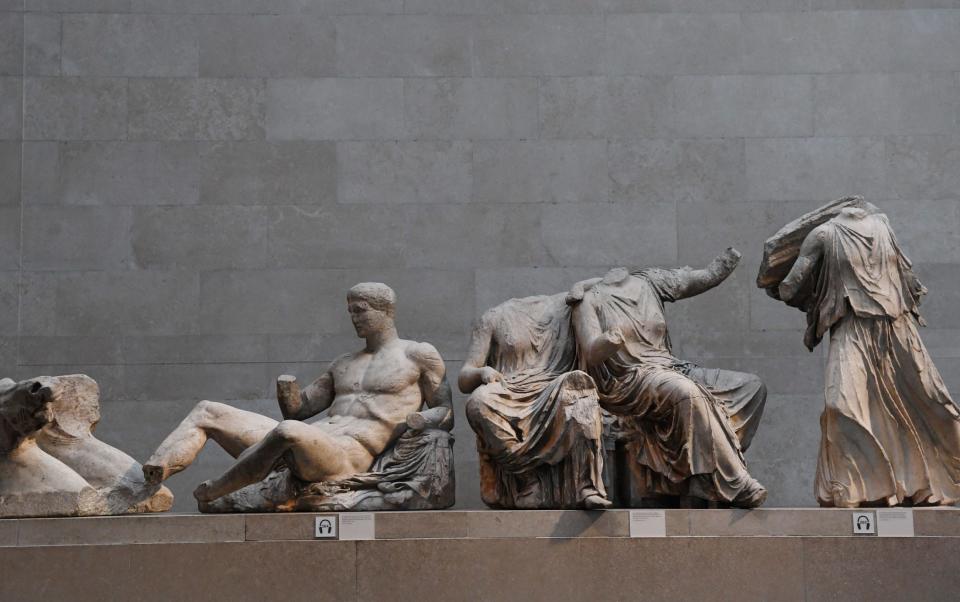Elgin Marbles ‘deal’ unlikely as Greece wary of ‘legal trap’

Greece would reject an Elgin Marbles “deal” with the British Museum, it has emerged, as any agreement could present a legal trap.
George Osborne, chairman of the British Museum, has suggested there is a “deal to be done” to share the sculptures between London and Athens in a loan arrangement that would end the stalemate in the enduring row over their future.
But Greece will refuse any such deal rather than be caught in a legal trap, The Telegraph has learned, as officials would be forced to accept British ownership of the Marbles in order to obtain them on loan.
Any agreement between the British Museum and the Acropolis Museum in Athens - the likely recipient of any loaned statues - would require the Greek side to tacitly or explicitly recognise that the 2,500-year-old sculptures are legally owned by the British Museum, potentially jeopardising any future claim for their repatriation as “stolen” objects.
It is understood this would be a red line for Greek ministers who have always maintained Lord Elgin stole the famous Marbles from the Acropolis in the early 19th century, and that Greece is the true legal owner of the long-contested sculptures.
Nothing less than full repatriation by the UK would be acceptable to Greece, which will continue to push for the return of the sculptures to Athens.

News of this impasse comes after Mr Osborne last week declared that both sides need to drop their “preconditions” and “red lines” in order to reach a “sensible” agreement over the future of the ancient artworks.
But the suggestion has been seen as a ploy by those campaigning for the return of the sculptures which once adorned the Parthenon, with renowned Cambridge classicist Prof Paul Cartledge - of the British Committee for the Reunification of the Parthenon Marbles - accusing Mr Osborne of engaging in “misdirection and disinformation“.
Fellow committee member Marlen Taffarello Godwin stated: “If George Osborne is genuinely hoping to open discussion to broker a deal, ‘without any red lines’, then that should include the question of the British Museum’s ownership.”
The Museum has maintained that it is the rightful owner of the statues, which it holds in its collection by law on behalf of the UK public - therefore requiring politicians to change legislation in order to release the ancient sculptures.
The UK Government has insisted that the future of the statues is a matter not for politicians but for the British Museum, while also maintaining that no changes to legislation are planned.
The two positions have led to a stalemate which Unesco has attempted to resolve, with talks brokered by the UN’s cultural body recently being set between Greece and the UK in order to deal with the dispute.
However, the UK Government distanced itself from the talks, saying that the contested sculptures would not be up for discussion at the talks called in order to discuss them, a position campaigners for the repatriation of the Marbles told The Telegraph was “farcical”.

The Marbles will remain in Room 18 of the British Museum, an institution which has controlled the 5th-century BC sculptures since 1816, when they were bought from Thomas Bruce, 7th Earl of Elgin.
Lord Elgin had taken scores of pieces from the Acropolis between 1801 and 1812 when Athens was under Ottoman rule, with the British Museum maintaining that he legally acquired the pieces from the local governor at the time.
The artworks created under the direction of Ancient Greek sculptor Phidias comprise statues, metopes, and sections of frieze mainly depicting various battles between civilised man and mythical enemies. They adorned the temple of Athena on the Acropolis.
The British Museum has said these contested pieces, and all other objects in the collection, would be considered for loan on a case-by-case basis.

 Yahoo Movies
Yahoo Movies 